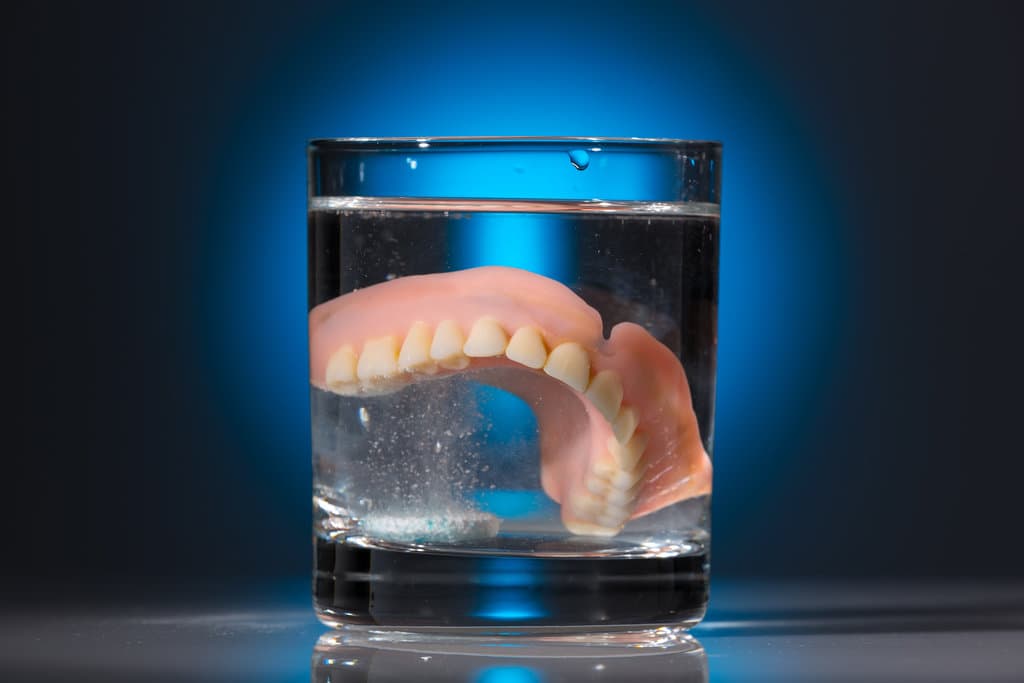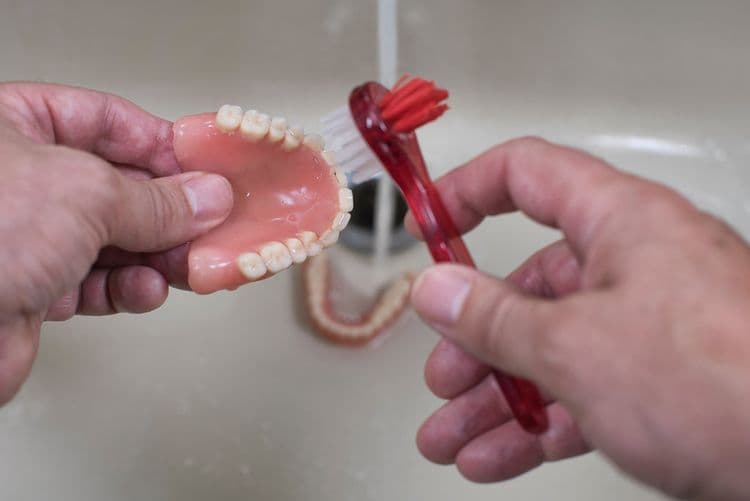Selecting the best denture cleaner requires understanding key ingredients and their efficacy. Sodium bicarbonate and citric acid are notable for stain removal and biofilm reduction. Effervescent tablets offer deep cleaning by reaching denture crevices. Gentle, plant-based solutions provide a sustainable approach, using natural enzymes and essential oils. Choosing the right cleaner is crucial for oral health and denture longevity. Evaluating options based on individual needs and storage practices is essential for ideal results.
Understanding the Importance of Proper Denture Care
Proper denture care is essential for maintaining oral health and preventing complications associated with denture wear. Daily denture hygiene habits greatly contribute to the preservation of oral tissues, reducing the risk of mucosal inflammation and oral infections such as stomatitis. Evidence-based practices emphasize the necessity of removing biofilm and food particles to prevent pathogenic colonization. The adherence to stringent cleaning protocols guarantees the longevity of dentures while promoting overall oral health benefits. Research indicates that consistent maintenance of oral prostheses can mitigate plaque accumulation and minimize residual ridge resorption. As a result, adopting effective denture hygiene habits is paramount for individuals relying on dentures to maintain oral health and enhance prosthetic longevity, assuring a comfortable and functional oral environment.
Key Ingredients to Look for in a Denture Cleaner
Selecting an effective denture cleaner hinges on understanding the key ingredients that guarantee perfect cleaning and maintenance of dental prostheses. Sodium bicarbonate, a mild abrasive, aids in removing surface stains while maintaining the integrity of the denture material. Effervescent agents, such as citric acid and sodium percarbonate, facilitate the release of oxygen, which assists in the mechanical removal of debris and biofilm. Antimicrobial agents like sodium hypochlorite play a pivotal role in controlling bacterial proliferation and maintaining hygienic denture storage conditions. Enzymatic components target organic residues, ensuring thorough cleaning. The inclusion of these ingredients should align with the recommended cleaning frequency, ensuring ideal plaque removal and longevity of the prostheses without compromising their structural or aesthetic properties.
Top Denture Cleaners for Daily Use
When evaluating top denture cleaners for daily use, critical factors include the presence of effective cleaning ingredients such as sodium bicarbonate and citric acid, which are clinically proven to remove biofilm and stains. User-friendly application methods, including effervescent tablets and brush-on gels, enhance compliance and ease of use. Additionally, formulations with long-lasting freshness properties, often containing mint or eucalyptus, contribute to sustained oral hygiene and wearer comfort.
Effective Cleaning Ingredients
Guaranteeing ideal hygiene in denture maintenance requires the use of effective cleaning agents specifically formulated to eliminate bacterial biofilm, stains, and debris. An evidence-based approach to denture hygiene emphasizes the importance of cleaning routines that incorporate active ingredients such as sodium hypochlorite, citric acid, and sodium bicarbonate. These components are clinically proven to effectively dissolve organic matter and inhibit microbial colonization on prosthetic surfaces. Sodium hypochlorite, commonly used in dental disinfectants, provides potent bactericidal properties, while citric acid aids in stain removal through its chelating capabilities. Sodium bicarbonate serves as a mild abrasive and pH regulator, enhancing the overall cleaning efficacy. The strategic use of these ingredients guarantees the preservation of denture integrity and oral health, contributing considerably to effective maintenance practices.
User-Friendly Application Methods
Maneuvering the landscape of denture maintenance involves understanding user-friendly application methods that streamline daily hygiene routines. Evidence suggests that integrating a standardized cleaning frequency can greatly impact oral health. Daily denture soaking is advocated by dental professionals to guarantee the removal of plaque and debris, minimizing the risk of oral infections. Top denture cleaners commonly utilize effervescent tablets, requiring immersion in warm water for best results. This method is clinically proven to enhance cleaning efficiency while maintaining the structural integrity of the prosthetic. Additionally, user-friendly application often includes easy-to-follow instructions, reducing the margin for error in routine care. By incorporating these practices, wearers can achieve consistent maintenance, thereby promoting prolonged denture lifespan and improved oral well-being.
Long-Lasting Freshness Formula
In the quest for ideal oral hygiene, selecting a denture cleaner with a long-lasting freshness formula is essential. Such formulations are engineered to provide extended odor control, considerably enhancing the user’s daily oral experience. Clinically, the formula effectiveness is determined by its ability to break down odor-causing bacteria and residues without compromising the structural integrity of the dentures. Several studies have demonstrated that cleaners containing enzymatic agents and active oxygen compounds deliver superior long-lasting freshness compared to traditional counterparts. These components work synergistically to penetrate biofilm layers, ensuring thorough cleansing. Denture cleaners with proven formula effectiveness not only maintain freshness throughout the day but also promote overall oral health by minimizing bacterial proliferation, thereby reducing the risk of infections and irritations.
Best Effervescent Tablets for Deep Cleaning
Effervescent tablets represent a highly effective option for deep cleaning dentures, leveraging their rapid release of cleansing agents upon dissolution. This mechanism guarantees thorough plaque removal and bacterial eradication, pivotal for maintaining oral health. The effervescent benefits include their ability to reach crevices and hard-to-clean areas within the denture surface, which manual brushing may overlook. Tablet comparisons reveal that formulations vary in active ingredients such as sodium bicarbonate and citric acid, which synergistically enhance the cleaning efficacy. Some products incorporate antimicrobial components like sodium perborate, providing additional microbial control. Scientifically, these tablets have demonstrated superior biofilm disruption compared to non-effervescent solutions. Users should consider individual product reviews and clinical endorsements when selecting the most appropriate effervescent tablet for their denture cleaning regimen.
Gentle Solutions for Sensitive Dentures
Many individuals with sensitive dentures require gentle cleaning solutions to prevent irritation and preserve denture integrity. Sensitive formulas are specifically designed to minimize abrasive interactions that could compromise the denture surface or exacerbate oral sensitivity. These formulations often utilize gentle foaming action, which effectively dislodges debris and plaque without necessitating vigorous scrubbing. Such action is particularly beneficial in preserving the structural integrity of delicate denture materials, including those prone to microfractures or discoloration. Clinical evaluations have underscored the efficacy of these gentle foaming agents in reducing microbial load while maintaining comfort for the user. Moreover, these preparations are often hypoallergenic, reducing the risk of adverse reactions in individuals with heightened sensitivity. To summarize, gentle denture cleaners provide an ideal balance of efficacy and safety for sensitive oral appliances.

Natural and Environmentally Friendly Options
In the context of denture cleaning, plant-based solutions offer an effective alternative that minimizes chemical exposure while maintaining oral hygiene. Research indicates that biodegradable denture products not only reduce environmental impact but also provide comparable cleaning efficacy to conventional cleaners. These natural formulations often incorporate enzymes and essential oils, which have been clinically shown to break down biofilm and reduce microbial load.
Plant-Based Cleaning Solutions
Despite the plethora of chemical-laden denture cleaners available on the market, an increasing body of research highlights the efficacy and benefits of plant-based cleaning solutions, which provide a natural and environmentally friendly alternative. Plant-based benefits include minimizing exposure to potentially harmful synthetic chemicals while maintaining effective antimicrobial properties. These solutions often utilize essential oils and naturally derived enzymes, which have been demonstrated to effectively remove biofilm and stains from dentures. Eco-friendly alternatives are vital in reducing the environmental impact associated with conventional cleaners. Additionally, these plant-based products often come in recyclable packaging, enhancing their sustainability profile. Clinical studies have validated their safety and efficiency, making them a viable option for individuals seeking to maintain oral hygiene with reduced environmental footprint.
Biodegradable Denture Products
The exploration of plant-based cleaning solutions naturally extends to the consideration of biodegradable denture products, which align with the growing demand for sustainable oral hygiene solutions. These products employ eco friendly ingredients, minimizing adverse environmental impacts. The formulation typically involves natural enzymes and essential oils, which are effective in removing plaque and stains without harsh chemicals. Biodegradable denture cleaners often utilize sustainable packaging, reducing waste and carbon footprint. Clinical studies have demonstrated their efficacy, showing comparable results to traditional cleaners in maintaining denture hygiene. Additionally, these products are increasingly favored by consumers prioritizing environmental conservation and health-conscious choices. As sustainability becomes a pivotal factor, biodegradable denture products represent a viable option in the domain of oral care.
User Reviews and Testimonials: What Do Consumers Say?
How do consumers perceive the efficacy and usability of denture cleaners? User experiences indicate a broad spectrum of satisfaction levels, heavily influenced by individual cleaning routines and product compatibility. A significant number of users report effective removal of stains and residues, attributing positive outcomes to consistent application within their cleaning regimen. Testimonials frequently emphasize ease of use as an essential factor, with many consumers favoring products that integrate seamlessly into their daily routines. Conversely, some users express dissatisfaction, citing ineffectiveness in eliminating tough stains or complaints about unpleasant odors. However, these negative reviews are often context-specific and contingent upon personal expectations or improper use. Overall, consumer feedback underscores the variability in personal experience, highlighting the subjective nature of denture cleaner efficacy.
Tips for Maintaining Your Dentures in Prime Condition
Maintaining dentures in optimal condition requires adherence to a meticulous oral hygiene regimen, which extends beyond mere cleaning. Proper denture storage is critical; dentures should be immersed in water or a recommended soaking solution when not in use to prevent warping. The cleaning frequency should be daily, utilizing a soft-bristled brush and non-abrasive denture cleanser to remove plaque and food particles. Clinicians advocate for regular inspection to detect any surface irregularities or microbial biofilm accumulation. Additionally, periodic professional evaluations guarantee ideal fit and function while minimizing oral tissue complications. Evidence suggests that diligent care, including consistent cleaning and appropriate storage, considerably enhances the longevity and efficacy of dentures, thereby preserving oral health and patient comfort.
Making the Right Choice for Your Denture Cleaning Needs
Selecting an appropriate denture cleaning solution is pivotal for guaranteeing effective oral hygiene and prolonging the lifespan of dentures. Evidence-based guidelines suggest that the selection process requires consideration of individual cleaning frequency and specific storage needs. Different solutions offer varied efficacy against microbial biofilms, which can greatly impact oral health. For instance, enzymatic cleaners are recommended for daily use due to their superior plaque removal capabilities. In addition, certain solutions can offer dual benefits by facilitating denture storage while maintaining moisture levels, thereby preventing warping. It is crucial to adhere to manufacturer instructions regarding cleaning frequency to optimize outcomes. Clinicians advocate for routine assessment of denture condition and cleaning protocols to confirm compatibility with the chosen cleaning regimen, thereby enhancing overall denture maintenance.
Frequently Asked Questions
How Often Should Dentures Be Cleaned to Prevent Stains?
Dentures require daily cleaning for effective stain prevention. Evidence-based guidelines recommend a consistent routine that includes brushing and soaking to maintain oral hygiene and prevent discoloration, thereby ensuring longevity and functionality of the dental prosthesis.
Can Denture Cleaners Damage Dental Implants or Natural Teeth?
Denture cleaners, if improperly used, may cause adverse chemical reactions leading to denture material compatibility issues. However, they should not damage dental implants or natural teeth when used as directed, according to clinical guidelines and evidence-based research.
Are Homemade Denture Cleaners as Effective as Commercial Ones?
The effectiveness of homemade denture cleaners compared to commercial ones depends on specific homemade ingredients and cleaning methods used. Evidence suggests some homemade solutions may lack the antimicrobial properties present in commercial formulas, potentially reducing their overall efficacy.
What Are the Signs of an Allergic Reaction to Denture Cleaners?
Allergic symptoms to denture cleaners may include oral irritation, swelling, or rash, commonly resulting from sensitivity to denture ingredients. Symptoms such as burning sensations or difficulty breathing necessitate immediate medical evaluation to prevent severe allergic reactions.
How Does Water Temperature Affect the Effectiveness of Denture Cleaners?
Water temperature greatly influences cleaner effectiveness. Higher temperatures generally enhance chemical reactions, increasing the dissolution rate of active ingredients, thereby improving cleaning efficacy. However, excessively hot water may damage dentures, necessitating a balanced approach. Clinical studies support this observation.


